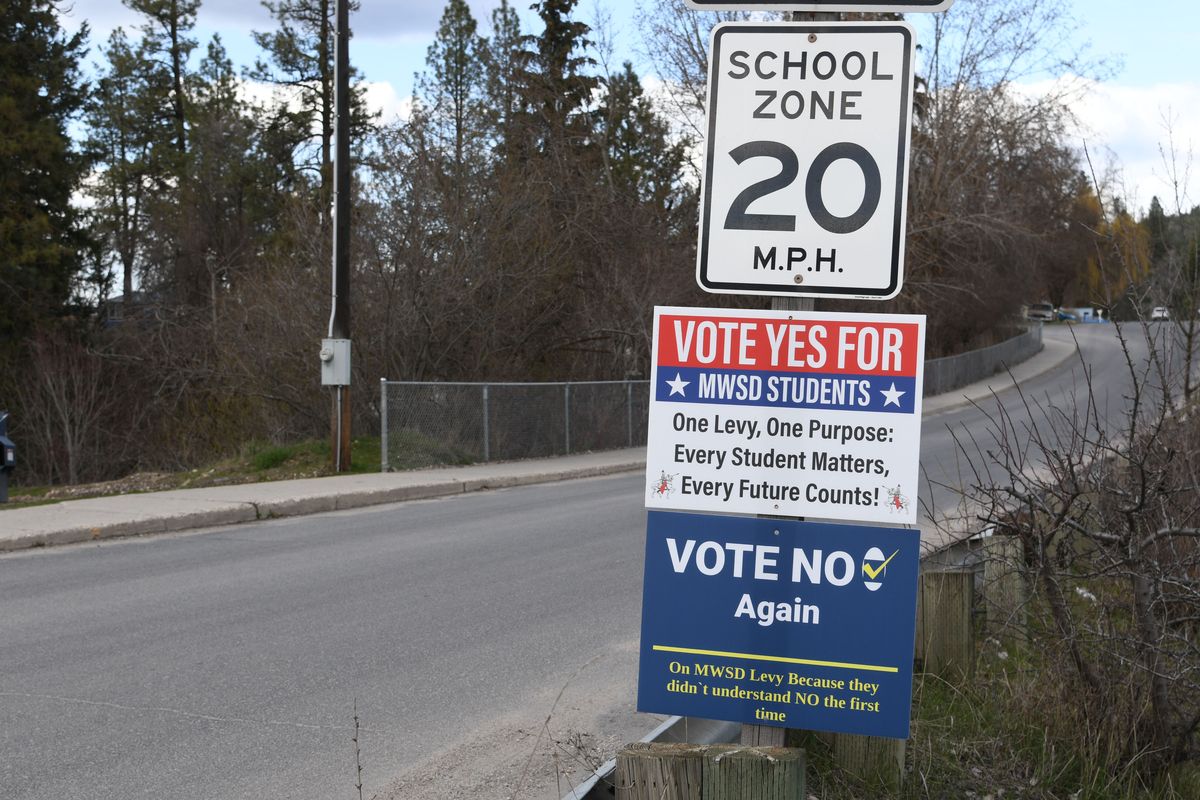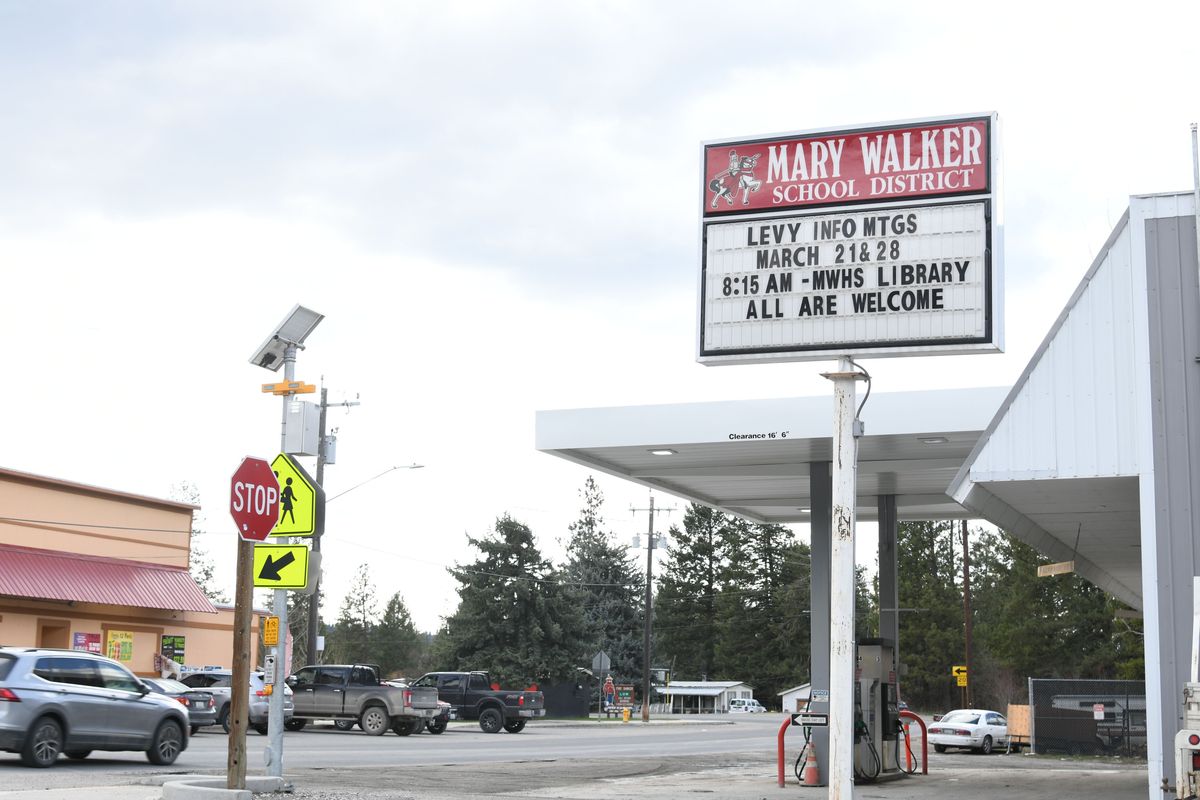Man appointed to write a voter pamphlet statement against the Mary Walker school levy argued for the levy instead
Campaign signs for and against the Mary Walker School District levy compete alongside each other near the school campus in Springdale, Washington on Thursday, April 3, 2025. (James Hanlon/The Spokesman-Revie)
SPRINGDALE, Wash. – The voter pamphlet for the Mary Walker School District levy this month includes an argument in favor of the measure, but the argument against it is conspicuously missing.
Stevens County Auditor Lori Larsen rejected the “against” statement submitted by Malaki Norris, in part, for “misleading and inappropriate content.” Because the statement actually argued in favor of the levy, labeling it under “against” would mislead voters, Larsen’s rejection notice said.
Some say this was an intentional attempt to silence those opposed to the levy by making it appear in the voter pamphlet that no one was against it. School officials say they didn’t know what Norris would write. Norris’ 248-word statement describes his positive experiences attending the school district while growing up and counters common concerns about the levy.
“This Levy helps give students the chance to learn, play sports, and be a part of something bigger,” he wrote. “Every student deserves the chance to reach their potential, just like I had. Our community’s kids deserve the same support that I was lucky enough to have. Please think about what this means for their future before you vote.”
The Springdale-based school district is re-running a replacement operations levy that failed in February with 55.6% voting against it.
About 560 students are enrolled in the rural district about 35 miles northwest of Spokane with a K-8 school and a high school.
The school board decided to immediately re-run the levy April 22 for essentially the same amount with rounded numbers. The levy would collect $2.8 million over four years at a rate of $1.5 per $1,000 of assessed property value.
The February voter pamphlet included an against statement written by school board member John Axtell.
Yet after the levy failed, the board re-appointed the person who wrote the first “for” statement, but voted against re-appointing Axtell. Instead, the board appointed Norris, who was not listed in attendance at the meeting.
Axtell said he abstained from voting on his own appointment because that would be inappropriate.
Under state law, elected officials and staff members can join committees as long as they keep their activities separate from their official duties.
Board Chair Jeff Canfield said he voted against appointing Axtell because his last statement contained information and figures he believed were misleading.
“I don’t know what this other guy is going to write, but I know what John wrote,” Canfield said of why he voted for Norris.
Norris declined to comment when reached by phone.
“I don’t have to answer any questions,” he said.
Axtell complained that Norris was appointed alone when up to three people can join a committee. The “for” committee has three members.
“The board did not allow those individuals who expressed an opinion they wanted to be on the committee, even though there were two open spaces,” Axtell said.
Canfield said the “for” committee applied together as a group, whereas Axtell and Norris applied individually. He didn’t think it was the board’s place to force two people who don’t know each other to work together.
Persons ‘known to oppose’
Canfield said he knows of Norris, because it is a small community, but he doesn’t know him personally and he doesn’t know anything about his political views.
The Washington law on voter pamphlets says local boards should “whenever possible” appoint people who live within the jurisdiction “and are known to oppose the measure to serve on the committee advocating rejection.”
Axtell said the board violated the law because they knew Axtell was against the levy, but they did not know Norris’ views since he made no previous statements about it. What’s more, the board knew of at least one other person vocally against the levy.
Gary Witherspoon had spoken against it at multiple meetings. He didn’t understand how the process of joining the committee worked, he said, otherwise he would have applied.
“I sat there and thought, wow, I really would have liked to write a rebuttal,” Witherspoon said.
Superintendent Todd Spear said a staff member told him about Norris’ interest in writing a statement. He never spoke with him directly.
“We are educators here,” Spear said. “We’re not trained how to run elections.”
Canfield said if the school board required proponents and opponents of a levy to submit statements before they were appointed, the board could be certain they were for or against. But that would mean judging the content of the statements, which could be biased.
Canfield and Spear said they couldn’t comment on whether it was a misunderstanding on Norris’ part, if perhaps he was actually trying to join the “for” committee.
Larsen rejected the idea it could have been an honest mistake.
“They had an effective known member in the community,” Larsen said, referring to Axtell.
Axtell said his concern is no longer about the levy itself, but what he says is election interference.
“It is not about the amount of the levy, the issue is the violation of the (state law),” he said.
Empty committees
For whatever reason, it is common for ballot proposition committees to go unseated – on both sides – but especially committees against whatever the issue is. It could be from a lack of awareness about the opportunity, a lack of interest from the public or a lack of effort by the boards who appoint them.
Last year, Larsen told The Spokesman-Review the problem with entrusting the same board that is proposing a ballot measure with seating a committee against the issue is that there is nothing stopping them from appointing someone they know would do a bad job. She still sees that weakness in the system, but she was not expecting this “egregious” situation.
“There’s a difference between doing a poor job of an against statement and writing a for statement,” Larsen said.
Larsen’s rejection notice, which was carbon copied to Spear, gave 48 hours to appeal. She said she received no response from Norris.
Spear said he didn’t see the email right away. He later reached out to Larsen after the deadline and asked if they could reappoint Axtell and offered for the school district to pay the cost of reprinting.
Larsen said it wasn’t about the cost. She has strict deadlines to follow for administering the election and distributing the pamphlets.
If a board fails to appoint a committee, the county auditor has the authority to appoint an alternate committee on a first come basis. But by the time she received the statement from Norris, it was past the deadline where she could have appointed an alternate had the board appointed no one at all.
Steven Thompson, a resident of the school district who ran unsuccessfully for county commissioner last year, has a standing request with the auditor to join any unfilled committee he is qualified for. Thompson campaigned partly on his complaint that the commission did not appoint an against committee for a 2023 ballot proposition on raising the sales tax to build a new jail.
He suggested the election should be canceled.
“You are lucky to have a second chance, then you do something to deceive the voting public when a second chance comes?” Thompson said.
Thompson said they should at least have to reuse the original arguments from the February levy. Because for comparison, candidates who run for office in a general election have to reuse the first statement they used in the primary election without a chance to rewrite it.
Larsen said she doesn’t have the authority to cancel an election. But she has other concerns about the district influencing the election. A series of videos filmed on school property appears to go beyond providing neutral information about the levy by calling on viewers to support it.
State law prohibits the use of public agency facilities by elected officials or staff for campaigns on propositions.
Canfield said that he filmed a set of videos supporting the levy by himself. They were shared on his wife’s Facebook account, not through the school district. He said he was told it was OK to film on school grounds as long as the opposition also had equal permission.
The superintendent produced a separate series from his office that were informational, explaining what would be lost if the levy fails, Canfield and Spear said. Those videos were published on the district’s website and accounts.
“Our students are counting on us,” Spear says in one video. “They deserve every opportunity we can give them. Please vote on April 22 to protect and support Mary Walker’s students and secure the future of our community.”
“Does that mean vote yes?” Spear responded. “That wasn’t my intention, just: get your vote in.”
Debate about the levy
A campaign sign in town says “Vote no again … because they didn’t understand NO the first time.”
Canfield said the board decided to rerun the levy without a reduction because the February election had low turnout. After the levy failed, he heard from community members who said they didn’t vote or didn’t understand what the levy did.
“We just thought maybe we could take the opportunity to get more information out,” Canfield said.
Axtell said it is dishonest of the district to call it a “replacement levy” because it will increase the current rate.
It’s true the rate will increase, Canfield said, but it is also the same rate that voters approved four years ago. That’s because the rate decreases as property values rise.
Currently the rate is about $0.99 per $1,000. When the rate drops below $1, Canfield said the district loses access to Local Effort Assistance funds from the state. The program provides extra funding to school districts with low property valuations as long as they maintain a levy.
That’s another reason they didn’t consider a rate decrease, Canfield said. It would make it more likely for the rate to drop below $1 again within the next four years.
In the February voter pamphlet, Axtell argued against the levy because of poor student performance.
Spear said Mary Walker is an impoverished, working-class district where many students are bound for trade schools. Test scores are not a priority for some students, and there are other measures of success.
“We’re not giving up on our kids,” he said.
If the levy fails, Spear said the district would need to cut five to seven certified teachers and at least 10 classified staff, which would mean larger class sizes and less individual attention for students. Athletic programs would also face significant cuts.
Canfield said the most unfortunate thing about the whole situation is how much it has divided the community.
Axtell, Canfield and Spear reported threats or rude comments made by community members on both sides.
“It’s so hard to see the community so against each other,” Canfield said. “I know people who will vote no and I respect their decision. We don’t have to be nasty to each other.”

